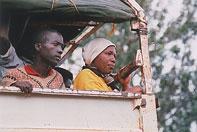|
afrol News, 20 January - After the widely criticised head-over-heal repatriation of 25,000 Rwandan refugees from Tanzania, the Zambian government also is "voluntarily" returning the 5000 Rwandan refugees left in the country. The UN brokered deal is expected to become a blueprint for the return of some 60,000 Rwandans still living across Africa. The UN refugee agency UNHCR on Thursday signed an agreement with the governments of Rwanda and Zambia to begin "the voluntary return by air" of more than 5,000 Rwandan refugees in Zambia, "an agreement that could serve as a blueprint for similar arrangements in the region," UNHCR notes. Speaking at the opening of the two-day meeting in Kigali on Wednesday, UNHCR's Wairimu Karago said that her agency had changed its policy from merely facilitating to actively promoting voluntary repatriation to Rwanda. She added that this policy would be harmonised and implemented across the African region in a consistent manner. - UNHCR has consulted on and examined the prevailing conditions in the region with regard to Rwandan refugees, said Ms Karago, "especially the positive social and political developments in Rwanda, which have resulted in a substantial increase in the number of Rwandan refugees voluntarily electing to return home. As a result, we have reviewed and changed our policy from merely facilitating voluntary returns to actively promoting voluntary repatriation to Rwanda." She added that UNHCR's decision has since been vindicated by concrete steps that the Rwandan government has taken to ensure that conditions are conducive for the voluntary repatriation of Rwandan refugees, the UN agency reports. Ms Karago noted in particular the recent release from custody of 40,000 persons facing various allegations connected to the 1994 genocide and the commitment by Rwandan authorities to judiciously implement the process of Gacaca, a traditional court system. - The UN refugee agency in Zambia will immediately begin preparing profiles of the more than 5,000 Rwandan refugees in Zambian camps, the agency reports. "It will highlight, in particular, their areas of origin ahead of the airlift to Rwanda, expected to begin this April." The agency would also launch an information campaign in Zambian camps, where many of the refugees are located, to inform them of plans being made for their return home. "They will learn more about the return package and reintegration support they will receive upon their return to Rwanda." As Zambia gears up for the return of Rwandan refugees, UNHCR was simultaneously collecting data on other Rwandan refugees in various countries throughout the African continent. This will be used for an appeal to donors for funds to facilitate organised repatriation movements, returnee monitoring and reintegration of Rwandans. Some 60,000 Rwandan refugees are estimated to be scattered across many countries in Africa. Concluding her remarks at the Kigali meeting, UNHCR's Karago expressed her hope that the agreement signed by the three parties – the governments of Rwanda and Zambia and UNHCR – would not only "reflect the legitimate wishes of the refugees to return home in safety and dignity, but will also be the blueprint for other tripartite arrangements for the voluntary repatriation of Rwandan refugees". For Zambia, a poor country facing acute food shortages, the repatriation of some of the refugees residing in the country will be of importance. Also an estimated 40,000 Angolan refugees live in Zambia, which are to be repatriated at a slower paste. Tens of thousands of refugees from Congo Kinshasa and Burundi also reside in Zambia. Currently, almost 3 percent of Zambia's population are refugees, signifying great expenses for the Lusaka government. While a repatriation of refugees to their country of origin - if safe - is generally welcomed, the sudden and rapid repatriation of Rwandans has caused protests among humanitarian organisations. The Washington-based US Committee for Refugees questioned whether the "rushed" repatriation of 25,000 Rwandan refugees from Tanzania in December really was "voluntary". The Tanzanian government had given the refugees an ultimatum of little more than two months to "repatriate voluntarily." Pressure had been high and the UNCHR did not have the manpower to organise such an operation in an acceptable way, a study had shown. The US group concludes that the UN refugee agency had given into Tanzanian pressure when it agreed to organise the repatriation. "UNHCR should have negotiated a more reasonable schedule for the repatriation of Rwandan refugees living in Tanzania or should have delayed commencement of the exercise until a safe and dignified return could be ensured," spokesman Joel Frushone said. The timetable for the repatriation of 5000 Rwandans from Zambia is somewhat more relaxed than the Tanzanian repatriation. Refugees are expected to have left by the end of the year, giving the UNCHR nine months to organise the airlift when the operation starts in April. No ultimatum from the Lusaka government exists and the UNCHR therefore had an easier task in negotiation conditions. Sources: Based on UNHCR, US Committee for Refugees and afrol archives
|
front page
| news
| countries
| archive
| currencies
| news alerts login
| about afrol News
| contact
| advertise
| español
©
afrol News.
Reproducing or buying afrol News' articles.
You can contact us at mail@afrol.com

